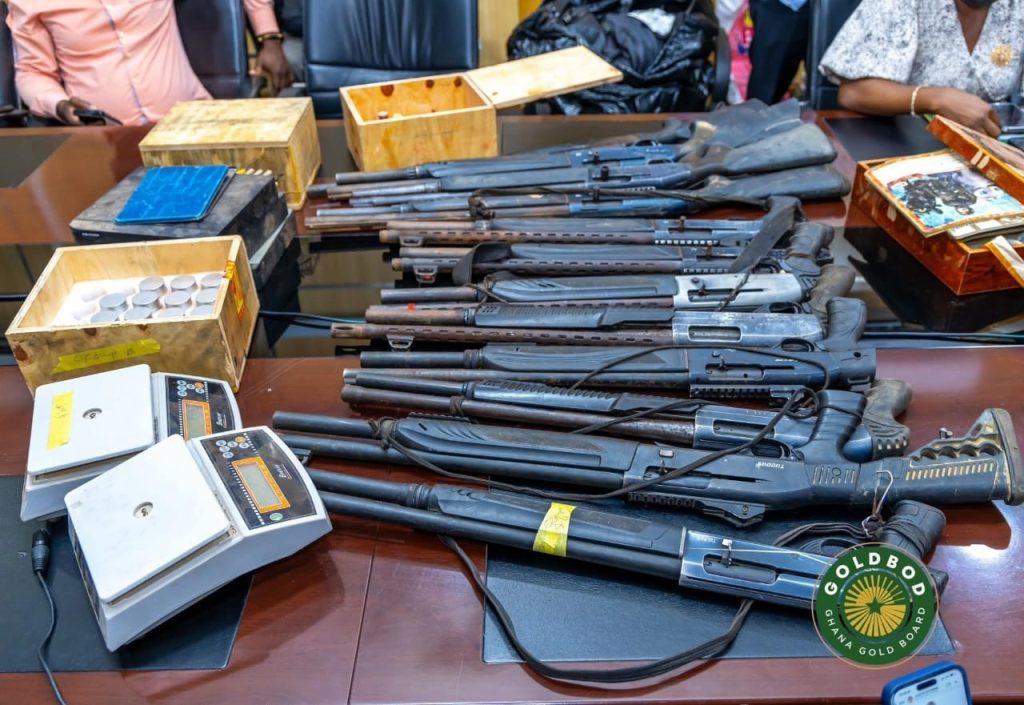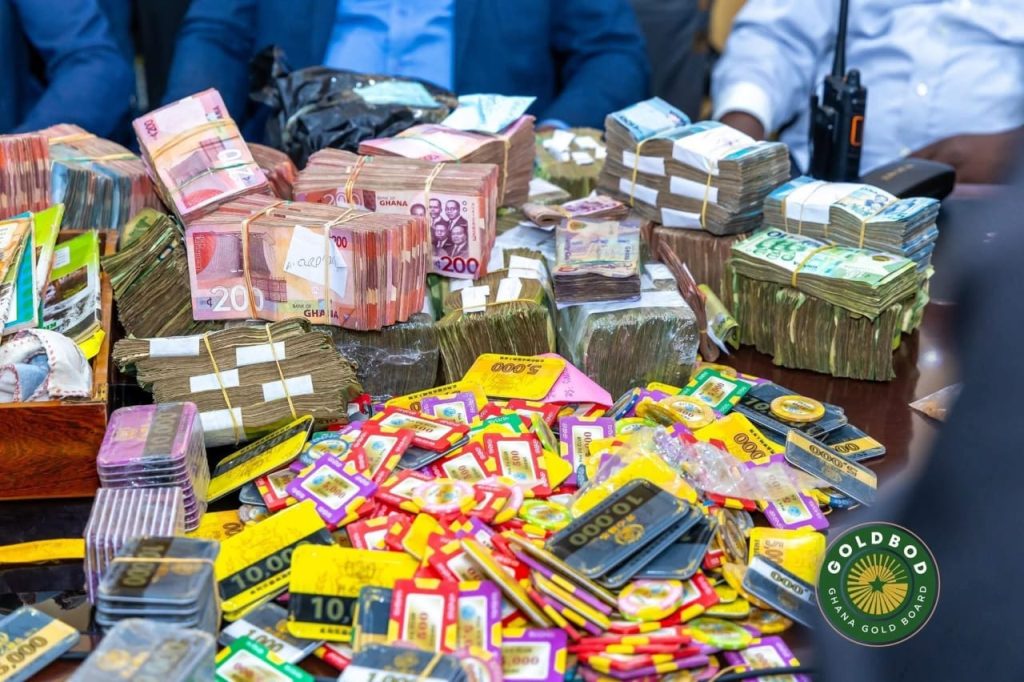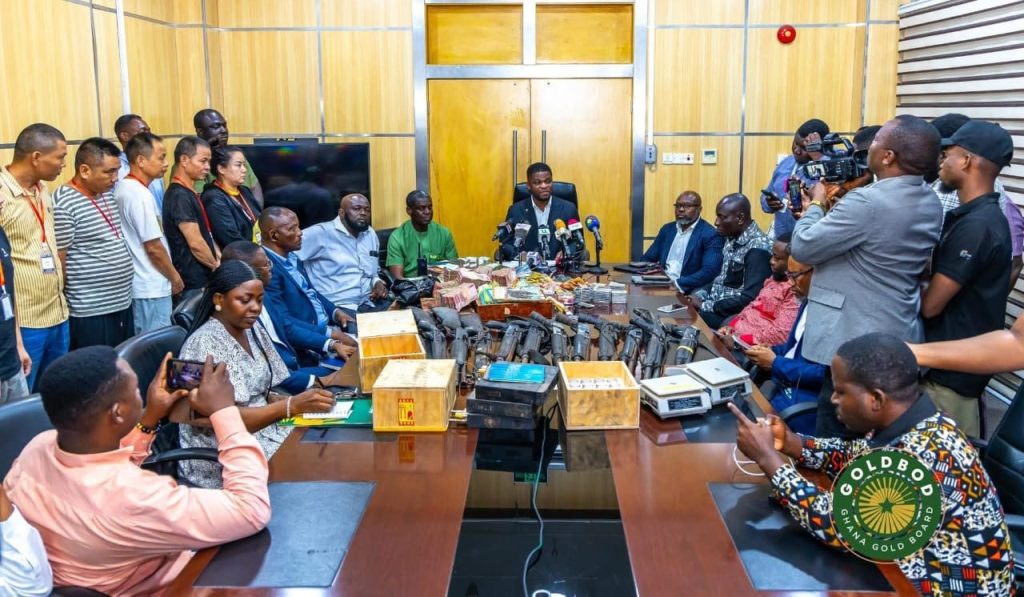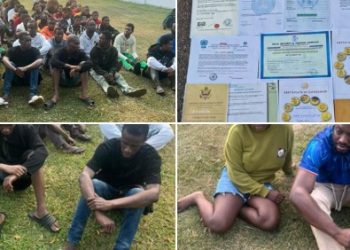The Ghana GoldBod Taskforce has carried out a major enforcement operation in Asankragua, a mining town in the Western Region cracking down on illegal gold trading to protect the nation’s precious mineral wealth.
The operation, which resulted in the arrest of ten Chinese nationals, is being hailed as a turning point in the country’s battle against illicit mining and the smuggling of natural resources.
The sting operation, orchestrated with precision and secrecy, highlights the increasing resolve of Ghanaian authorities to enforce mining regulations and dismantle foreign-dominated illegal trading networks that have undermined local livelihoods for years.
Multi-million cedi haul
The Taskforce seized 1.3 kilograms of gold—estimated to be worth over GH₵1.4 million—alongside GH₵1.3 million in cash.

In a surprising twist, casino playing cards were also discovered at the scene, raising suspicions of potential links to organized crime and international money laundering syndicates.
Authorities are now examining whether the smuggled gold was being used to finance other illicit ventures.
“This was not just an isolated case of illegal mining,” a senior enforcement official involved in the operation disclosed.
“The scale and the items recovered point to a well-coordinated network, with financial footprints possibly stretching beyond Ghana’s borders.”
The bust has sent ripples through the local mining community and prompted fresh questions about how deeply embedded such networks are in Ghana’s mineral economy.


Foreigners barred from local gold trade
In a press briefing shortly after the arrests, Sammy Gyamfi, the Chief Executive Officer of GoldBod—the regulatory authority overseeing gold trading in Ghana—reaffirmed the agency’s unwavering commitment to enforcing the GoldBod Act 1140.
The law, which bans foreign nationals from participating in Ghana’s small-scale gold trade, aims to safeguard the interests of Ghanaian miners and ensure the nation reaps the full benefit of its mineral wealth.
“Today marks a significant step in our fight against illegal gold trading,” Gyamfi declared.
“We will not tolerate any individual or group that seeks to undermine our laws and exploit our resources. The GoldBod Taskforce is here to protect our gold from illegal exploitation, and we will hold accountable anyone who bypasses our regulations.”
He further emphasized that the law is not just about enforcement, but about economic justice.
“This is about protecting the Ghanaian worker, the legal miner, the economy of our country,” he said.
“No one—whether Ghanaian or foreign—should be allowed to operate outside the law.”
The growing threat of gold smuggling
Ghana, Africa’s top gold producer and the world’s sixth-largest, has long struggled with the scourge of gold smuggling.

While the country officially exported over $6 billion worth of gold in 2023, experts believe a significant volume continues to be trafficked out of the country through unregulated channels, costing the state millions in lost revenue and weakening investor confidence in the mining sector.
Local communities have also borne the brunt, with small-scale legal miners complaining of being priced out or pushed aside by deep-pocketed foreign operatives, often working under the guise of partnerships with Ghanaian frontmen.

The GoldBod Taskforce, established to directly tackle this issue, has pledged to increase surveillance, audit gold buying firms, and collaborate with security agencies to track illicit movements of gold.
The game has changed
The arrest of the ten Chinese nationals is being interpreted by industry watchers as a clear warning to those involved in illegal gold trade: the days of lax enforcement and silent complicity are over.
Further investigations underway
GoldBod officials confirmed that investigations are ongoing to determine the extent of the suspects’ operations, their local collaborators, and the potential international links.
It is expected that the suspects will face charges under the GoldBod Act and the country’s anti-money laundering laws.
The Taskforce is also seeking assistance from the Financial Intelligence Centre and the Ghana Immigration Service to establish how the foreign nationals entered the country and whether they operated under legitimate business permits.
A defining moment in resource protection
As Ghana steps up its efforts to reclaim control over its gold sector, the success of this operation underscores the power of coordinated regulatory action and political will.
With a government-backed Taskforce, updated legislation, and greater public awareness, the country appears to be drawing a hard line against illegal gold trade.
For communities in Asankragua and other mining towns, the operation has rekindled hope that Ghana’s gold will finally benefit its rightful owners—the people.











